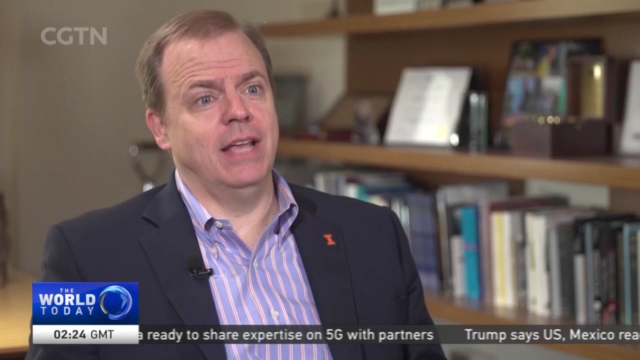
11:17, 08-Jun-2019
China-US Trade War: Tensions threaten Chinese students' access to American universities
Updated
00:01, 10-Jun-2019
03:26

Now moving to the ongoing tensions between China and the U.S. One area that's potentially threatened is higher education. An estimated 360-thousand Chinese students attend American universities, a market worth some 15 billion dollars. But U.S. authorities are seeking to restrict the numbers over what they call security and economic concerns. CGTN's Dan Williams has the story from the state of Illinois.
American universities draw interest from around the world. According to the U.S. Department of Commerce, nearly 1.1 million international students studied in the U.S. in the 2017-18 school year generating 45 billion dollars. Around a third of those students are from China. But that relationship is under threat. Chinese students have found themselves in the middle of increased tensions between the U.S. and China fueled in large part by the ongoing trade war. A tightening of American visa restrictions has seen denials and delays increase, making it difficult for Chinese students to complete their studies.
JASON LIU CHINESE STUDENT & SCHOLAR ASSOCIATION NORTHWESTERN UNIVERSITY "It's sad for students. They are more afraid if they go back to China to visit parents, they are more afraid they might not come back again."
DAN WILLIAMS CHAMPAIGN, ILLINOIS "There will no doubt be a number of universities examining their potential exposure if the number of Chinese students was to suddenly fall. And some may choose to follow the example of the University of Illinois at Urbana Champaign and take out an insurance policy."
The University of Illinois at Urbana Champaign is home to some 5,800 Chinese students. 800 of those students attend the University's Gies College of Business, accounting for a fifth of the school's income. Realizing the risk, Jeff Brown, the dean of the school, took out an insurance policy.
JEFF BROWN DEAN, GIES COLLEGE OF BUSINESS UNIVERSITY OF ILLINOIS "In the event of visa restrictions, student visas were cancelled or in the event of a global health outbreak and they don't let students travel, we would be reimbursed for our losses up to a one-time payment of sixty million dollars. Not that this would permanently solve the problem but it would buy us time."
That insurance policy, costing a premium of 424,000 dollars annually, expires next year. Although the college wants to renew there are concerns the premiums could become even more expensive, given the escalating trade dispute. Longer term, Brown would like to see a change in policy making it easier for international students to stay and work in the U.S., even after their studies.
JEFF BROWN DEAN, GIES COLLEGE OF BUSINESS UNIVERSITY OF ILLINOIS "When we train somebody and they have a Ph.D. in engineering, why wouldn't we want to keep them here to create companies and innovate jobs rather than send them back. I will tell you, most of the students that graduate from my college would prefer to stay here and work. The reason is, we have made it difficult for them to do so."
There are a number of factors that could see China student numbers in the U.S. fall, not least rising tuition costs. But the current trade tensions between the two countries could have the impact of quickening the decline. Dan Williams, CGTN, Champaign, Illinois.

SITEMAP
Copyright © 2018 CGTN. Beijing ICP prepared NO.16065310-3
Copyright © 2018 CGTN. Beijing ICP prepared NO.16065310-3